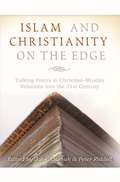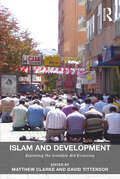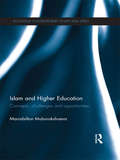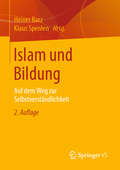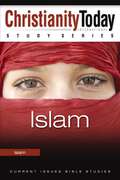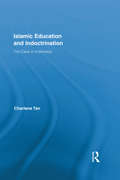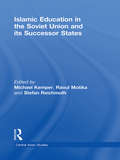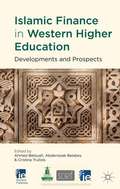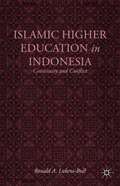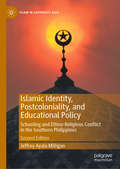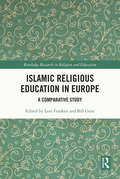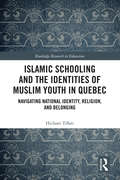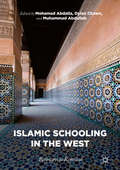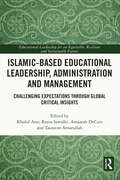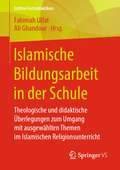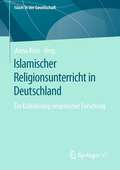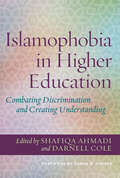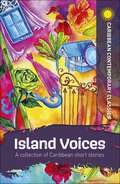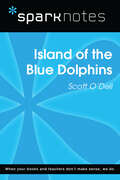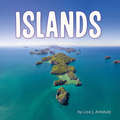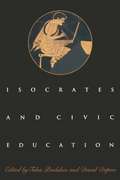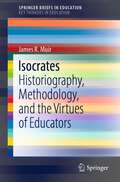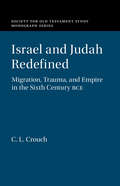- Table View
- List View
Islam and Christianity on the Edge: Talking Points in Christian-Muslim Relations into the 21st Century
by John Marks Caroline Cox John Azumah Bernie Power Michael Nazir-Ali Peter Cotterell Derek Tidball Peter Riddell Tony Lane Gordon Nickel Anthony O’mahony Sean Oliver-Dee Gerry Redman Keith Small Charlotte ThorneycroftThe relationship between Christianity and Islam is complex. This collection of essays by scholars and human rights activists engages with some of the most pressing issues in Christian-Muslim relations, addressing matters of theology, the encounter between civilisations and inter-religious affairs. Some of the most controversial and sensitive questions are considered, ranging from sacred text to the politics of multiculturalism. These are key questions for the 21st century, a period when Christianity and Islam are destined to interact more closely than ever before in human history.
Islam and Development: Exploring the Invisible Aid Economy
by Matthew Clarke David TittensorThe study of Islam since the advent of 9/11 has made a significant resurgence. However, much of the work produced since then has tended to focus on the movements that not only provide aid to their fellow Muslims, but also have political and at times violent agendas. This tendency has led to a dearth of research on the wider Muslim aid and development scene. Focusing on the role and impact of Islam and Islamic Faith Based Organisations (FBOs), an arena that has come to be regarded by some as the 'invisible aid economy', Islam and Development considers Islamic theology and its application to development and how Islamic teaching is actualized in case studies of Muslim FBOs. It brings together contributions from the disciplines of theology, sociology, politics and economics, aiming both to raise awareness and to function as a corrective step within the development studies literature.
Islam and Higher Education: Concepts, Challenges and Opportunities (Routledge Contemporary South Asia Series)
by Marodsilton MuborakshoevaThis book is the first study to qualitatively explore the concepts of higher education in Muslim contexts. It examines the different concepts of ‘a university’ and the way they shape practice in Muslim contexts, with a particular focus on the Islamic republic of Pakistan. Contributing to theoretical debates and discussing practical challenges that universities in Muslim countries face, the author analyses seven higher education institutions in Pakistan. She argues that there is a need for institutions to constantly review their mission and aims and objectives in light of the wider economic, political, and socio-cultural and religious development of a society. The book reviews the history of higher education institutions and examines opportunities for some Pakistani universities, to become centres of excellence in the future. This is subject to adequate support from the government, industries, philanthropists and the society at large. In return, these universities would have to cater to the needs of the society, from basic needs in the areas of health and education to science and technology. Islam and Higher Education breaks new grounds in the field of higher education in Muslim contexts and will be of interest to researchers in the fields of comparative education and Islamic Studies.
Islam und Bildung: Auf dem Weg zur Selbstverständlichkeit
by Heiner Barz Klaus SpenlenAusgewiesene Expertinnen und Experten analysieren die vielfältigen Erscheinungsformen muslimischen Glaubens in Deutschland. Neben Dschihadismus und Salafismus widmet sich der Band vor allem auch der schweigenden Mehrheit der Muslime, die ihren Glauben als Bestandteil ihrer Kultur friedlich leben will. Deutlich wird, dass im gelebten Islam heute auch produktive Traditionen mit Betonung auf Bildung und Wissenschaft wirksam werden.
Islam: An Introduction to Religion, Culture, and History
by James A. BeverleyThe Christian Today Study Series delves into today's vital cultural issues to get to the heart of what these topics mean to you.Each 8-week study is based on articles written by some of today's leading Christian authors and published by the Christianity Today magazines. These remarkable studies will foster deep, authentic, and relevant discussion that will challenge and grow any small group.Islam will take on a variety of topics, such as: Violence & Peace in IslamUnderstanding Islamic BeliefsUnderstanding JihadReaching Out to Muslim Neighbors & FriendsBased on articles by a variety of authors, such as:Stan GuthrieWendy Murray ZobaMiriam Adeney
Islamic Education and Indoctrination: The Case in Indonesia (Routledge Research in Education)
by Charlene TanIslamic schools, especially madrasahs, have been viewed as sites of indoctrination for Muslim students and militants. Some educators and parents in the United States have also regarded introductory courses on Islam in some public schools as indoctrinatory. But what do we mean by "indoctrination"? And is Islamic education indoctrinatory? This book critically discusses the concept of indoctrination in the context of Islamic education. It explains that indoctrination occurs when a person holds to a type of beliefs known as control beliefs that result in ideological totalism. Using Indonesia as an illustrative case study, the book expounds on the conditions for an indoctrinatory tradition to exist and thrive. Examples include the Islamic school co-founded by Abu Bakar Ba’asyir and the militant organisation Jemaah Islamiyah. The book further proposes ways to counter and avoid indoctrination through formal, non-formal, and informal education. It argues for the creation and promotion of educative traditions that are underpinned by religious pluralism, strong rationality, and strong autonomy. Examples of such educative Muslim traditions in Indonesia will be highlighted. Combining philosophical inquiry with empirical research, this book is a timely contribution to the study of contemporary and often controversial issues in Islamic education.
Islamic Education in the Soviet Union and Its Successor States (Central Asian Studies)
by Michael Kemper Raoul Motika Stefan ReichmuthThis book provides a comparative history of Islamic education in the Soviet Union and the post-Soviet countries. Case studies on Ukraine, Azerbaijan, Kazakhstan, Uzbekistan, and Tajikistan and on two regions of the Russian Federation, Tatarstan and Daghestan, highlight the importance which Muslim communities in all parts of the Soviet Union attached to their formal and informal institutions of Islamic instruction. New light is shed on the continuity of pre-revolutionary educational traditions – including Jadidist ethics and teaching methods – throughout the New Economic Policy period (1921-1928), on Muslim efforts to maintain their religious schools under Stalinist repression, and on the complete institutional breakdown of the Islamic educational sector by the late 1930s. A second focus of the book is on the remarkable boom of Islamic education in the post-Soviet republics after 1991. Contrary to general assumptions on the overwhelming influence of foreign missionary activities on this revival, this study stresses the primary role of the Soviet Islamic institutions which were developed during and after the Second World War, and of the persisting regional and even international networks of Islamic teachers and muftis. Throughout the book, special attention is paid to the specific regional traditions of Islamic learning and to the teachers’ affiliations with Islamic legal schools and Sufi brotherhoods. The book thus testifies to the astounding dynamics of Islamic education under rapidly changing and oftentimes extremely harsh political conditions.
Islamic Finance in Western Higher Education
by Cristina Trullols Ahmed Belouafi Abderrazak BelabesThis is the first of its kind in its topical coverage of the developments and prospects of Islamic finance education at Western higher education. Intended to establish itself as a unique reference for academics and researchers this book gives an insight into ethics and values in curricula development at business schools and in finance departments.
Islamic Higher Education In Indonesia
by Ronald A. Lukens-BullThis project looks at the work of the faculty in Indonesia's National Islamic Institutes to address, respond, and prevent the success of radical Islamic discourse and institution of Shari'a law in the school system.
Islamic Identity, Postcoloniality, and Educational Policy: Schooling and Ethno-Religious Conflict in the Southern Philippines (Islam in Southeast Asia)
by Jeffrey Ayala MilliganThis book theorizes a philosophical framework for educational policy and practice in the southern Philippines where decades of religious and political conflict between a minority Muslim community and the Philippine state has plagued the educational and economic development of the region. It offers a critical historical and ethnographic analysis of a century of failed attempts under successive U.S. colonial and independent Philippine governments to deploy education as a tool to mitigate the conflict and assimilate the Muslim minority into the mainstream of Philippine society and examines recent efforts to integrate state and Islamic education before proposing a philosophy of prophetic pragmatism as a more promising framework for educational policy and practice that respects the religious identity and fosters the educational development of Muslim Filipinos. It represents a timely contribution to the search for educational policies and practices more responsive to the needs and religious identities of Muslim communities emerging from conflict, not only in the southern Philippines, but in other international contexts as well.
Islamic Intellectual History in the Seventeenth Century
by Khaled El-RouayhebFor much of the twentieth century, the intellectual life of the Ottoman and Arabic-Islamic world in the seventeenth century was ignored or mischaracterized by historians. Ottomanists typically saw the seventeenth century as marking the end of Ottoman cultural florescence, while modern Arab nationalist historians tended to see it as yet another century of intellectual darkness under Ottoman rule. This book is the first sustained effort at investigating some of the intellectual currents among Ottoman and North African scholars of the early modern period. Examining the intellectual production of the ranks of learned ulema (scholars) through close readings of various treatises, commentaries, and marginalia, Khaled El-Rouayheb argues for a more textured - and text-centered - understanding of the vibrant exchange of ideas and transmission of knowledge across a vast expanse of Ottoman-controlled territory.
Islamic Religious Education in Europe: A Comparative Study (Routledge Research in Religion and Education)
by Leni Franken Bill GentAgainst the backdrop of labour migration and the ongoing refugee crisis, the ways in which Islam is taught and engaged with in educational settings has become a major topic of contention in Europe. Recognising the need for academic engagement around the challenges and benefits of effective Islamic Religious Education (IRE), this volume offers a comparative study of curricula, teaching materials, and teacher education in fourteen European countries, and in doing so, explores local, national, and international complexities of contemporary IRE. Considering the ways in which Islam is taught and represented in state schools, public Islamic schools, and non-confessional classes, Part One of this volume includes chapters which survey the varying degrees to which fourteen European States have adopted IRE into curricula, and considers the impacts of varied teaching models on Muslim populations. Moving beyond individual countries’ approaches to IRE, chapters in Part Two offer multi-disciplinary perspectives – from the hermeneutical-critical to the postcolonial – to address challenges posed by religious teachings on issues such as feminism, human rights, and citizenship, and the ways these are approached in European settings. Given its multi-faceted approach, this book will be an indispensable resource for postgraduate students, scholars, stakeholders and policymakers working at the intersections of religion, education and policy on religious education.
Islamic Schooling and the Identities of Muslim Youth in Quebec: Navigating National Identity, Religion, and Belonging (Routledge Research in Education)
by Hicham TiflatiThis insightful text examines the impact of Islamic schooling on Muslim youth in French-speaking Canada to consider how these institutions influence the formation of students’ cultural, national, ethnic, and religious identities, and their sense of belonging to Quebec and Canada. Through close qualitative analysis of interviews conducted with first- and second-generation students, as well as parents, teachers, and leaders involved in Islamic high schools, this text explores how far institutions succeed in preparing young Muslims to participate in the broader secular society in Quebec and in English-speaking Canada. As well as investigating the historical and contemporary development of Islamic schooling in Canada, and addressing public perceptions of this educational sector, the volume foregrounds the voices of those directly involved in these schools to illustrate first-hand experiences, and the motivations and objectives of those choosing to support or engage in these schools. Overarching themes include citizenship, integration, and the complex interplay of Muslim, Quebecois, and Canadian values. This book will be of great interest to graduate and postgraduate students, researcher scholars and academics in the fields of religion, education, Islamic studies, multicultural education curriculum studies, and faith-based teacher education.
Islamic Schooling in the West: Pathways To Renewal
by Mohamad Abdalla Dylan Chown Muhammad AbdullahThis book presents the views of leading scholars, academics, and educators on the renewal of Islamic schools in the Western context. The book argues that as Islamic schools in Western contexts have negotiated the establishment phase they must next embrace a period of renewal. Renewal relates to a purposeful synthesis of the tradition with contemporary educational practice and greater emphasis on empirical research substantiating best practices in Islamic schools. This renewal must reflect teaching and learning practices consistent with an Islamic worldview and pedagogy. It should also inform, among other aspects, classroom management models, and relevant and contextual Islamic and Arabic studies. This book acquaints the reader with contemporary challenges and opportunities in Islamic schools in the Western context with a focus on Australia.
Islamic-Based Educational Leadership, Administration and Management: Challenging Expectations through Global Critical Insights (Educational Leadership for an Equitable, Resilient and Sustainable Future)
by Khalid Arar Rania Sawalhi Amaarah DeCuir Tasneem AmatullahOffering a vital, critical contribution to discussions on current perspectives, practices and assumptions on Islamic education, this book explores the topic through a wide range of diverse perspectives and experiences. This volume challenges current assumptions around what is known as Islamic education and examines issues around educational leadership based on Islamic principles to confront xenophobia and Islamophobia in educational systems, policies and practices. Arguing for a new term to enter the discourse – ‘Islamic-based’ educational leadership – chapters approach the issue through critical reflexivity and diverse perspectives, addressing issues such as the higher education of immigrant students around the globe and the rising tensions in Muslim and non-Muslim populations. Exploring topics ranging from the leverage of leadership to religious education, this text brings together a wide range of case studies, experiences and examinations to shed light to the different approaches of Islamic-based educational leadership, administration and management. This book will support researchers, doctoral students and scholars involved with multicultural education, school leadership and management studies, and education policy and politics more widely to explore new theories and practices that pave the way for future educational systems to meet faith-based demand in the school choice era.
Islamische Bildungsarbeit in der Schule: Theologische und didaktische Überlegungen zum Umgang mit ausgewählten Themen im Islamischen Religionsunterricht (Edition Fachdidaktiken)
by Fahimah Ulfat Ali GhandourDer Band ermöglicht unterschiedliche Zugänge und Denkkulturen zu verschiedenen theologischen Thematiken, die vordergründig aus einer Bildungsperspektive gedacht werden. Dabei wird die Breite der muslimischen Konzepte in ihrer Pluralität abgedeckt, mit je nach Autorin oder Autor systematischen, philologischen, philosophischen oder historischen Schwerpunktsetzungen, sowie einer pädagogischen Schwerpunktsetzung.
Islamischer Religionsunterricht in Deutschland: Ein Kaleidoskop empirischer Forschung (Islam in der Gesellschaft)
by Anna KörsDas Buch gibt einen breiten und interdisziplinären Überblick zur empirischen Forschung über den islamischen Religionsunterricht in Deutschland zehn Jahre nach Einführung der Islamischen Theologie an deutschen Universitäten und der Ausbildung von islamischen Religionslehrkräften für den schulischen Religionsunterricht. Damit bietet es einen kaleidoskopischen Blick auf die Vielfalt und unterschiedlichen Facetten vorliegender empirischer Erkenntnisse aus Theologie, Religionspädagogik, Islamwissenschaft, Erziehungswissenschaft, Soziologie und verweist zugleich auf zukünftige Forschungsperspektiven und -bedarfe des noch jungen und dynamischen Forschungsfeldes.
Islamophobia in Higher Education: Combating Discrimination and Creating Understanding
by Shafiqa Ahmadi and Darnell ColeWhile Islamophobia was present in our society before 9/11, it has become more pervasive in recent years. This is evidenced by the current social and political climate, hate speech and hate crimes directed at Muslims, and the Supreme Court’s upholding of Presidential Proclamation 645 that effectively bans Muslim immigration from coming to the U.S. What does this mean for Muslim students in college, and indeed for institutions of higher education as they navigate law and policy on the one hand and adhere to their mission of achieving inclusive and equitable educational environments on the other? Two thirds of Muslims in the U.S. are vexed with current policy, and there has been an alarming increase in reports of bigotry and discrimination against them since the 2016 presidential elections. The fear of Islam, in general, and Muslims, specifically, not only compels non-Muslims to differentially treat Muslims, but also trade some of their own civil rights and civil liberties under the guise of national security. To address these issues, institutions require a nuanced understanding of laws and policies that institutionalize Islamophobia, and a greater understanding of the diverse college students that identify as Muslim. This book fills what has been a dearth of research that explores the experiences and navigation of Muslim students in colleges and universities, and addresses the even less studied domain of the experiences of Muslim students who hold multiple marginalized identities -- such as race, ethnicity, and LGBTQ status – as well as the intersection of those identities that may create multiple burdens of oppression and discrimination. This book begins by critically engaging with how current laws and policies institutionalize Islamophobia and affect the intersectionality and diversity within the Muslim community. It includes multidisciplinary voices, such as an international human rights attorney, a civil rights attorney, a criminal law attorney, student affairs practitioners, and research faculty whose work on this marginalized student population is traditionally not recognized within academic settings; and brings the voices of female Muslim scholars to the fore. Each chapter includes a critical analysis of the literature, a legal analysis when appropriate, a set of recommendations for policy and practice, and discussion questions.
Island Voices
by HodderEmbark on a journey through the vibrant tapestry of the Caribbean with this collection of stories from Hodder Education's 'Island Voices: Caribbean Contemporary Short Story Prize.' This volume showcases the winning authors and captures the essence of Caribbean storytelling, reflecting its rich cultural perspectives and diverse voices. These tales transcend entertainment, shedding light on societal nuances and driving change. As one captivated reader remarked, 'The stories in the Caribbean Contemporary Classics Collection transported me, making me feel the heartbeat of the islands.' Dive into these pages and discover the transformative power of storytelling as these prize-winning authors make their mark on the global literary stage.
Island Voices
by HodderEmbark on a journey through the vibrant tapestry of the Caribbean with this collection of stories from Hodder Education's 'Island Voices: Caribbean Contemporary Short Story Prize.' This volume showcases the winning authors and captures the essence of Caribbean storytelling, reflecting its rich cultural perspectives and diverse voices. These tales transcend entertainment, shedding light on societal nuances and driving change. As one captivated reader remarked, 'The stories in the Caribbean Contemporary Classics Collection transported me, making me feel the heartbeat of the islands.' Dive into these pages and discover the transformative power of storytelling as these prize-winning authors make their mark on the global literary stage.
Island of the Blue Dolphins (SparkNotes Literature Guide Series)
by SparkNotesIsland of the Blue Dolphins (SparkNotes Literature Guide) by Scott O'Dell Making the reading experience fun! Created by Harvard students for students everywhere, SparkNotes is a new breed of study guide: smarter, better, faster. Geared to what today's students need to know, SparkNotes provides: *Chapter-by-chapter analysis *Explanations of key themes, motifs, and symbols *A review quiz and essay topicsLively and accessible, these guides are perfect for late-night studying and writing papers
Islands (Earth's Landforms)
by Lisa J. AmstutzAll islands are surrounded by water, but there is more to these important landforms than meets the eye! Volcanoes formed some islands. Corals formed others. Some are old while others are new. Give beginning readers all the need-to-know information about islands, including their characteristics, how they form, and where they can be found around the world.
Isocrates and Civic Education
by Takis Poulakos David DepewCivic virtue and the type of education that produces publicly minded citizens became a topic of debate in American political discourse of the 1980s, as it once was among the intelligentsia of Classical Athens. Conservatives such as former National Endowment for the Humanities chairman William Bennett and his successor Lynn Cheney held up the Greek philosopher Aristotle as the model of a public-spirited, virtue-centered civic educator. But according to the contributors in this volume, a truer model, both in his own time and for ours, is Isocrates, one of the preeminent intellectual figures in Greece during the fourth century B. C. In this volume, ten leading scholars of Classics, rhetoric, and philosophy offer a pathfinding interdisciplinary study of Isocrates as a civic educator. Their essays are grouped into sections that investigate Isocrates' program in civic education in general (J. Ober, T. Poulakos) and in comparison to the Sophists (J. Poulakos, E. Haskins), Plato (D. Konstan, K. Morgan), Aristotle (D. Depew, E. Garver), and contemporary views about civic education (R. Hariman, M. Leff). The contributors show that Isocrates' rhetorical innovations carved out a deliberative process that attached moral choices to political questions and addressed ethical concerns as they could be realized concretely. His notions of civic education thus created perspectives that, unlike the elitism of Aristotle, could be used to strengthen democracy.
Isocrates: Historiography, Methodology, and the Virtues of Educators (SpringerBriefs in Education)
by James R. MuirIsocrates is one of the most remarkable and influential figures in the history of human thought. The influence of his ideas in the history of historical writing, rhetoric, the visual arts, music, religion and theology, political science, philosophy and, above all, educational philosophy and practice in Europe, Australia, North America, North Africa, and the Middle East are well established and widely known. This book argues careful study of the educational philosophy of Isocrates and its legacy can contribute to an improved understanding of the historiography of educational thought, his distinctive normative methodology in both political and educational philosophy, and his arguments about the primary importance of the virtues of self-knowledge and realistic self-appraisal for educational philosophers and practitioners. At a time when educational philosophy has an increasingly precarious academic existence and educationists are actively seeking new historiographical and methodological approaches to the philosophical study of education, there is much to be gained by recovering and reevaluating the historiography and normative methodology of Isocrates and the role they play in educational discourse and practice today.
Israel and Judah Redefined: Migration, Trauma, and Empire in the Sixth Century BCE (Society for Old Testament Study Monographs)
by C. L. CrouchIn Israel and Judah Redefined, C. L. Crouch uses trauma studies, postcolonial theory, and social-scientific research on migration to analyse the impact of mass displacements and imperial power on Israelite and Judahite identity in the sixth century BCE. Crouch argues that the trauma of deportation affected Israelite identity differently depending on resettlement context. Deportees resettled in rural Babylonia took an isolationist approach to Israelite identity, whereas deportees resettled in urban contexts took a more integrationist approach. Crouch also emphasises the impact of mass displacement on identity concerns in the homeland, demonstrating that displacement and the experience of Babylonian imperial rule together facilitated major developments in Judahite identity. The diverse experiences of this period produced bitter conflict between Israelites and Judahites, as well as diverse attempts to resolve this conflict. Inspired by studies of forced migration and by postcolonial analyses of imperial domination, Crouch's book highlights the crucial contribution of this era to the story of Israel and Judah.
